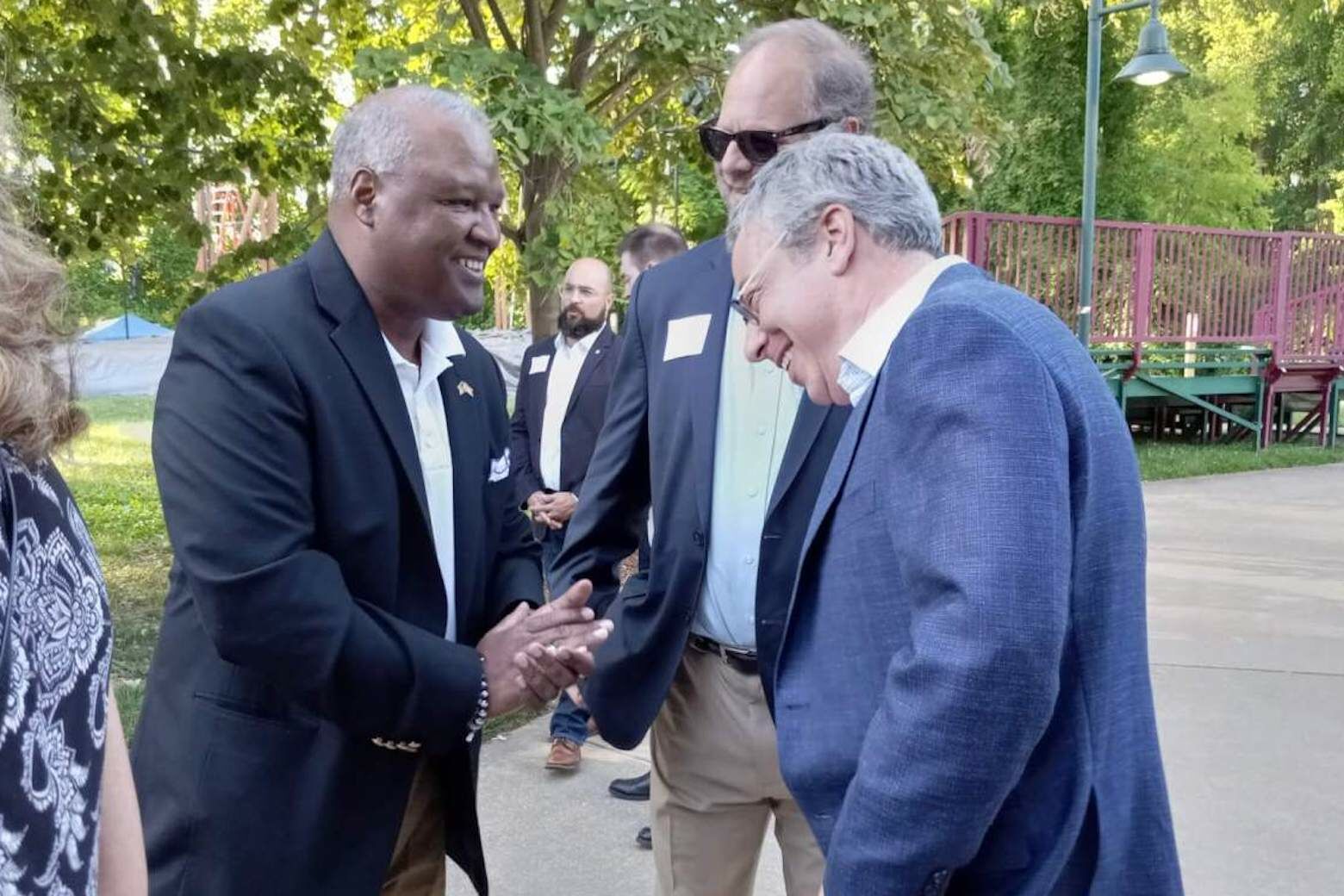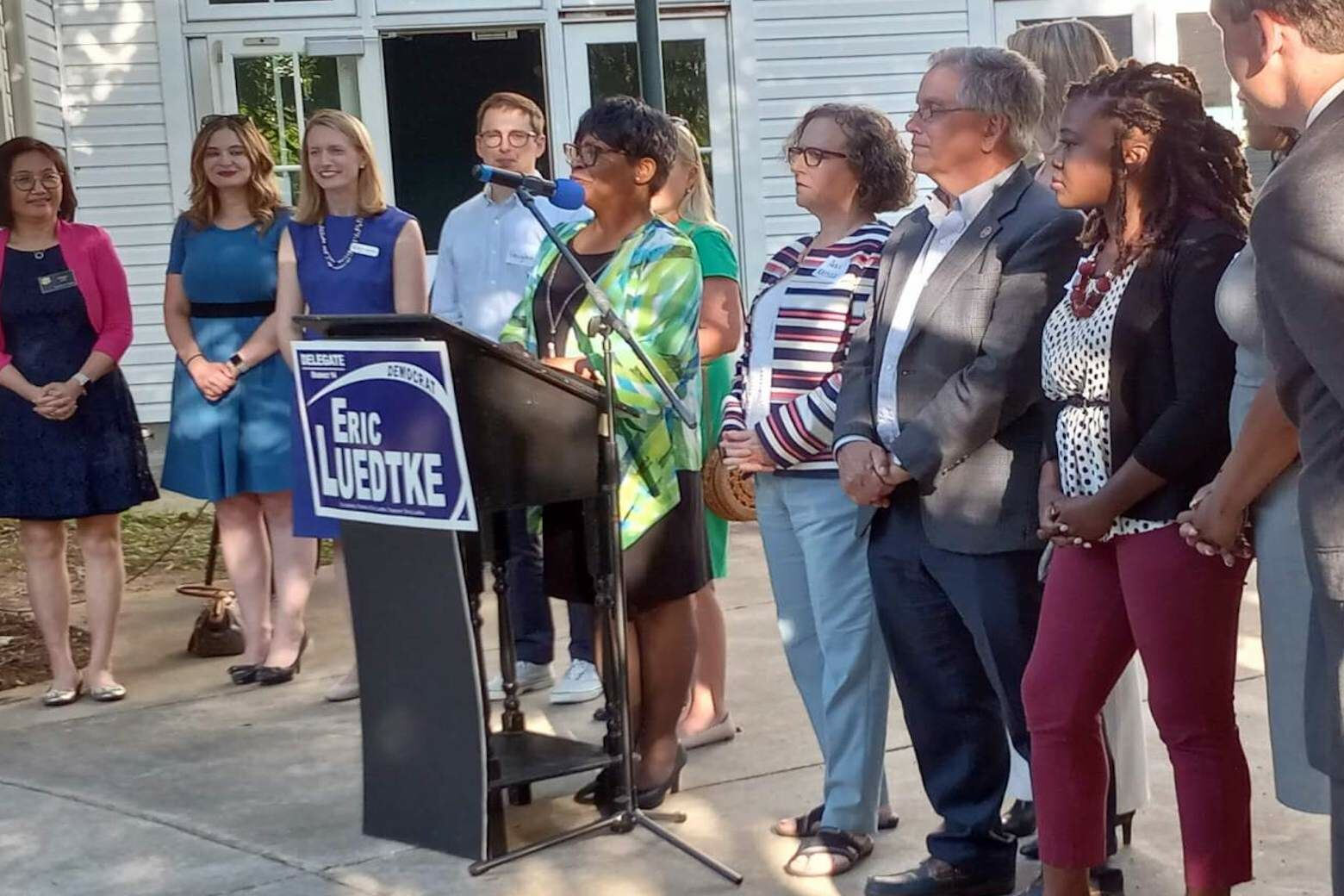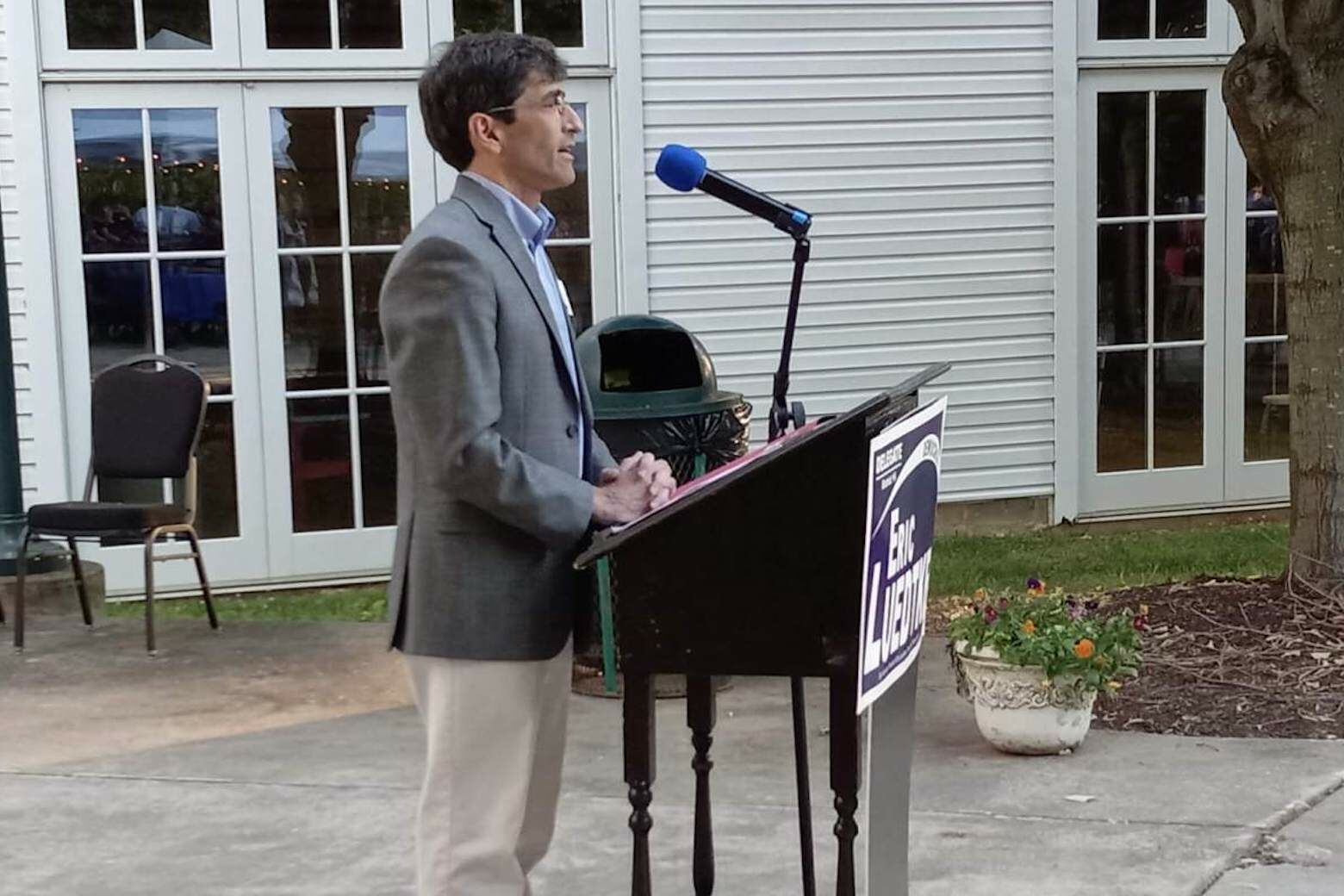This article was republished with permission from WTOP’s news partners at Maryland Matters. Sign up for Maryland Matters’ free email subscription today.

One of the consequences of the COVID-19 pandemic has been the absence of large-scale political events in Maryland for a year and a half. No schmoozing. No glad-handing. No speechifying.
But that changed dramatically and emphatically on Thursday night, when seven of the eight Democratic candidates for governor gathered together in the open air outside Olney Theater in Montgomery County and spoke, one by one, to a crowd of politicians, party activists, donors and State House lobbyists.
Officially, it was a fundraiser for House Majority Leader Eric G. Luedtke (D-Montgomery), a consequential figure in Annapolis. But Luedtke had the presence of mind to invite all the declared and likely Democratic candidates for governor.
“Much to my surprise, most of them decided to show up,” Luedtke said.
And suddenly, a nice political gathering on an unusually pleasant late spring evening became a happening.
“This is my first actual, real-life campaign event,” marveled one of the gubernatorial candidates, Michael Rosenbaum, a Baltimore tech entrepreneur and first-time candidate.
The evening was divided into four parts: First came the preliminary schmoozing, snacking and alcohol-free sipping, mostly maskless and featuring some awkward handshakes, fist bumps and hugs — along with some more emphatic greetings.
“We’re shaking hands now?” one campaign operative asked a man who extended a hand.
Then came the more traditional fundraising program: House Speaker Adrienne A. Jones (D-Baltimore County) and U.S. Rep. Jamie B. Raskin (D-Md.) extolling Luedtke’s virtues, Jones calling up every House member present, maybe 20 in all, to join her and Luedtke in front of the crowd. Then Luedtke spoke, sending praise Jones and Raskin’s way.

Luedtke quickly shifted gears and became the moderator of an impromptu gubernatorial forum. Of the candidates in the Democratic field, only former attorney general Douglas F. Gansler, who was attending a Democratic Attorneys General Association conference, did not appear.
Luedtke, like other party stalwarts, stressed the importance of electing a Democrat in 2022 after eight years of Republican Gov. Lawrence J. Hogan Jr. (R).
“We’ve had a governor who in my opinion doesn’t have a vision for this state and doesn’t work well with others,” Luedtke said. “…We need a governor who believes in people, in helping people.”
Each candidate then made his pitch. The crowd, used to talking through speeches at political events because they’ve heard all the lines before, was remarkably respectful, sizing up the candidates seriously, mindful that this was the public’s first significant exposure to the Democrats who would be governor. They were dead silent when Wes Moore, the former foundation executive and best-selling author spoke.
In all, it was a useful barometer of where the candidates think they are and the messages they want to transmit to this small core of Democratic activists, the few who are actually paying attention to the contenders one year and 11 days before the primary:
- Comptroller Peter V.R. Franchot emphasized his experience, which includes 14 years as a statewide elected official and 20 years in the legislature, and his commitment to customer service, calling himself a “pragmatic progressive.”
“I value results over rhetoric,” he said. “I want to restore Marylanders’ faith in the ability of government to deliver for them.”
Franchot, who spent the better part of the Hogan administration cozying up to the governor, criticized Hogan for the delays in getting unemployment checks out to struggling Marylanders, and also laid out some aspects of his biography that voters may not know, including his work in opposition to the Vietnam War, his campaigning for presidential candidate Eugene McCarthy in 1968, his anti-nuclear activism, and his time as director of the Vermont Public Interest Research Group.
- Former U.S. Education Secretary John B. King Jr. told the audience that “we’re gathering here tonight less than 10 miles from where my great-grandfather was enslaved, in Gaithersburg.” He told the story, he said, to think about how recently in history that was, but also “to contemplate that progress is possible.”
King talked about struggling as a youth after both his parents died, but also about his faith in the redemptive powers of education. And he described his work with a new progressive advocacy group, Strong Future Maryland, that worked on race and equity issues, climate change and tenant protections during the recent General Assembly session.
“I didn’t just talk about problems,” he said. “I didn’t just tweet about problems. I didn’t wax poetic on cable television about problems.”
- Former Prince George’s County Executive Rushern L. Baker III, the runner-up in the 2018 Democratic gubernatorial primary, started out by criticizing Hogan, whose decisions, he said, delayed the opening of the new state-of-the-art hospital in Largo and the launch of the Purple Line light rail project.
Baker said his career as a legislator and as county executive — and now running an institute at the University of Maryland College Park that trains incoming public officials — shows that he is prepared to tackle the challenges of the future.
“It is in my DNA to run toward a problem and to stay there until the problem is solved,” Baker said. He also name-checked the late House Appropriations Committee chairman Howard P. “Pete” Rawlings (D-Baltimore City), who, he said, taught him how to influence colleagues and become a more effective leader.
- Rosenbaum, the tech entrepreneur, touted his progression from a Clinton administration official to launching his own companies, taking chances on Baltimore and figuring out ways to train struggling Marylanders to enter into careers that would bring them into the middle class. He said his experience will enable him to take an entrepreneurial approach to government that will create opportunities for all.
“I took on these systems in business and won,” he said. “What we need to do as a state is take on these systems and win.”

- Jon Baron, another former Clinton administration official who then went to work for philanthropic organizations that focus on problem-solving, lamented that the same challenges that elected leaders talked about in the 1970’s still exist today. But he said his experience devising solutions to societal problems can translate to government work.
Baron also pledged: “I won’t take a dime of money from corporations or special interests.”
- Former Democratic National Committee Chairman Tom Perez, a likely candidate, recounted his experience as a Montgomery County Councilmember, as Maryland labor secretary and U.S. labor secretary, as chief of the civil rights division at the U.S. Justice Department, and as a board member of the immigrants’ rights group CASA.
Perez, who presided over the DNC during the 2020 presidential election cycle, joked about the size of the Democratic gubernatorial field. “There’s a lot of people thinking about running for governor. But I’m here to tell you, it’s 18 less than were running for president.”
He outlined his family’s history — his parents moved from the Dominican Republic to Buffalo, N.Y., “because of the similarities in the weather between Buffalo and the Dominican Republic” — and his philosophy about government’s role to help others.
“My parents taught me to make sure the ladder’s down,” Perez said, adding, “If you want to get to heaven, you’ve got to get letters of reference from the folks in the shadows.”
- Moore, who arrived at Luedtke’s fundraiser late and did not get to chat with people until after the event ended, opened with his own biography — which was shaped by the death of his father when he was 3 years old. Moore then discussed a credo he learned in the Army — which he observed is not practiced in Maryland, where stark disparities remain.
“In the Army, the first thing we learn is, we don’t leave people behind,” he said. “In fact, we send a battalion in to get them. We don’t leave people behind. Why as a state are we OK with that?”
Moore said he has dedicated his life to fighting inequality and would bring the same resolve to the governor’s office.
Moore, more than the other candidates, was mobbed by well-wishers as the fundraiser concluded. Maybe that was a function of him not being present for the preliminaries. Maybe it was because he was less well-known to this particular political crowd than some of the other candidates. Or maybe it’s because he has a dash of celebrity that the other candidates do not possess.
But if there was a winner among the candidates on the audience applause-o-meter, it was none of the gubernatorial contenders. That distinction belonged to Del. Brooke E. Lierman (D-Baltimore City), a candidate for comptroller — and the lone Democratic woman running for statewide office as of now.
Lierman’s quick speech, outlining the ways the comptroller’s office can be a force for progressive change and exhorting the crowd to “be bold and to think big,” got the biggest cheer of the night.
jkurtz@marylandmatters.org







